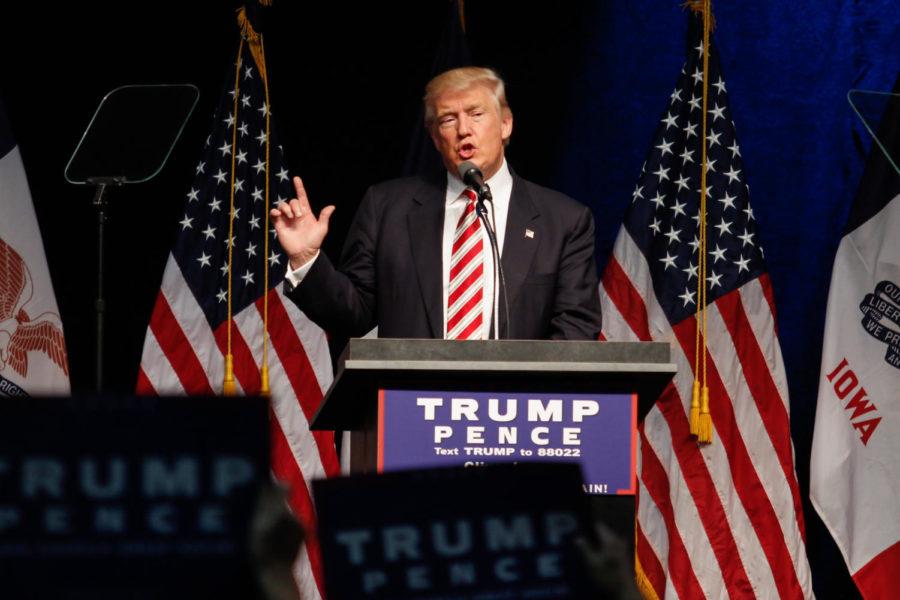Holst: How the media should cover Trump, part one
Now-President Donald Trump speaks to the crowd about then-Democratic presidential nominee Hillary Clinton’s emails on Sep. 13, 2016 in Clive, Iowa.
January 11, 2018
Check CNN right now. I’d bet a substantial amount of money — money I don’t have — that somewhere on your TV or laptop screen, there’s a story about Donald Trump.
You may have heard of him, as he is one of the most polarizing and divisive figures in American politics not just of today, but in living memory. I’d also wager Trump stories would be prominently featured in any respected newspaper or website, whatever slant they have.
But their one massive problem with this particular mass coverage: almost none of it is effective.
Before even discussing what the media is doing wrong, it is important to note a majority of Americans disapprove of the media’s coverage of Trump. This means it isn’t necessarily just Trump voters who disapprove of the coverage Trump receives. Other Americans who did not necessarily vote for Trump also disapprove of the coverage he receives.
Further, Trump’s approval ratings sit in the low 40s as I’m writing this, which means a substantial number of people disapprove of both Trump and the coverage he receives. This is not to say all of the people who criticize the media over their coverage of Trump have legitimate critiques. Many do not.
For example, the same Quinnipiac poll that found a majority of Americans disapproving of how the media covers Trump also found 39 percent of Americans believe the media often deliberately makes up negative stories about him. President Trump himself frequently asserts that the media blatantly makes up stories about him and his administration, although it must be said he offers very little evidence to support these assertions.
This is a criticism I will largely ignore, mostly because I don’t believe it to be true. However, many Americans do have concerns about the media that are very legitimate and likely contribute to widespread mistrust of the fourth estate.
So how should the media correctly cover Trump?
First of all, the media tends to focus far too much on things Trump does that might be stupid, petulant or mean, but are largely inconsequential.
There are numerous examples of this, from Trump accusing Megyn Kelly of having “blood coming out of her wherever” to tweeting about Mika Brzezinski’s face lift to his numerous nicknames for those who criticize him. Lyin’ Ted Cruz, Little Marco Rubio and the ever popular Crooked Hillary Clinton are just a few examples.
Now, I will be the first to tell you these tweets and quotes resemble the words of a middle school bully. This is a problem because nobody wants the most powerful man in the world to be somebody who has such a poor temperament. However, these issues aren’t what the media should be focusing on.
The media should spend less time focusing on Trump’s childish tweets and more time on covering how the policies he pushes affect Americans. After all, that has a real impact on the lives of Americans. A long TV segment on Trump’s latest incoherent and unkind tweets does very little to help Americans understand how the new tax bill will not benefit the average middle class family over the next 10 years.
People can tell for themselves what they think of Trump as a person, but they need the media to help them understand the nuance and impact of repealing the individual mandate.
One of the most nonsensical criticisms made frequently in media about Trump is he is “unpresidential.” This is a criticism so subjective and meaningless I could make the same point about any number of former presidents or presidential candidates. And the bottom line is, no rational person cares about how “presidential” the man is if they feel like he’ll make them safer or he’ll allow them to keep their job.
In short, the job of the media is not to evaluate the personality of the president because people can do that on their own.
View part two of “How the media should cover Trump.”







